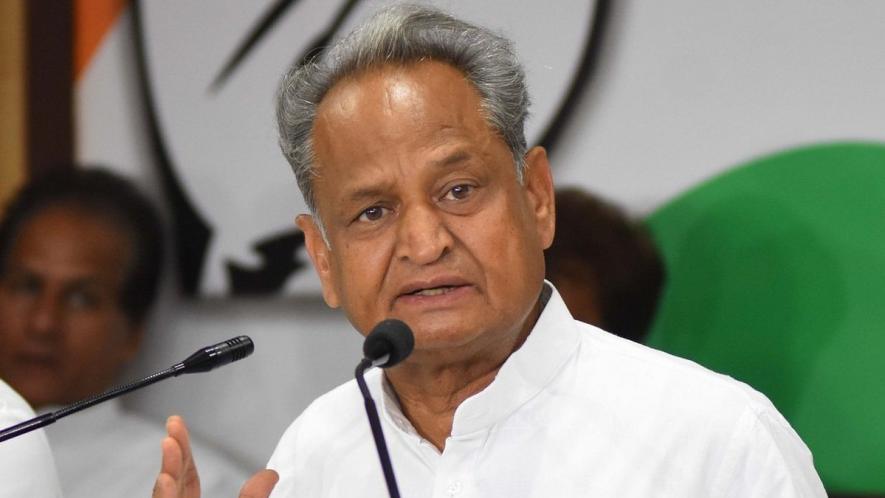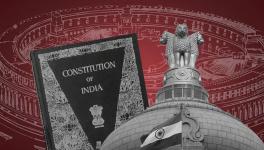By Invoking Sedition Law in Rajasthan, Congress has Betrayed its Promise to Abolish it

Representational image. | Image Courtesy: National Herald
The BBC’s India correspondent, Soutik Biswas, argued in August 2016 why India should get rid of its sedition law. The opening line of his piece was instructive: “In India, you can be charged with sedition for liking a Facebook post, criticising a yoga guru, cheering a rival cricket team, drawing cartoons, asking a provocative question in a university exam, or not standing up in a cinema when the national anthem is being played.”
To this list of specious reasons for booking people under section 124A of the Indian Penal Code, which defines sedition and spells out punishment for it, was added yet another entry last week—that of “horse-trading”. This term refers to the practice of paying money to legislators willing to defect from one party to another.
Almost as old as our democracy, horse-trading has been suddenly deemed seditious courtesy the Rajasthan Police, which filed two FIRs under section 124A (sedition) and section 120B (conspiracy) on 17 February. The police took this action after alleged audio tapes of conversations between a Bharatiya Janata Party representative, a political broker, and a Congress MLA went viral on social media. A third FIR invoking the sedition law was filed on 18 February, against the alleged political broker, Sanjay Jain alias Sanjay Bardia.
It is a testament to the heartlessness of Indian politics that Congress leader Sachin Pilot should, amidst the mounting death toll and a slowing economy caused by Covid-19, seek to align with the BJP to dislodge Ashok Gehlot from the chief minister’s chair in Rajasthan.
Yet it also requires a special kind of imagination to brand horse-trading as sedition, and wield section 124A as a weapon to vanquish political rivals. It is, in fact, downright hypocritical of the Congress to invoke 124A in Rajasthan.
Around a year ago, before the 2019 Lok Sabha elections, the Congress had promised to repeal section 124A in its election manifesto. Congress leader and former Home Minister P Chidambaram had then said, “Sedition is a colonial-era law. Many eminent people have said that sedition must go… It must go because it has become redundant due to subsequent laws.”
Since then, Chidambaram has consistently batted against section 124A. For instance, when the Delhi government gave the go-ahead, in February, for the prosecution of Kanhaiya Kumar, the youth leader, and nine others in a case related to sedition, Chidambaram tweeted, “Delhi government is no less ill-informed than the Central government in its understanding of sedition law. I strongly disapprove of the sanction granted to prosecute Kanhaiya Kumar….”
In the same month, Chidambaram objected to the Tripura government’s decision to file charges of sedition against those protesting the Citizenship Amendment Bill. “In Tripura, if you speak against the Citizenship Amendment Bill, you will be charged with sedition,” Chidambaram tweeted, adding, “Section 124A…must go lock, stock and barrel.”
The Congress could not have, obviously, fulfilled its promise of abolishing section 124A, as the BJP swept the 2019 Lok Sabha elections. Yet it could have demonstrated its liberal and democratic intent by instructing its state governments to refrain from invoking the sedition law. The party has, instead, expanded the very meaning and scope of sedition.
Until now, reams have been written on section 124A, its use by the British government against leaders of the national struggle, including Mahatma Gandhi and Bal Gangadhar Tilak, the debate and court battles after Independence whether it should be scrapped, and its chilling effect on free speech. The debate over section 124A has become particularly intense over the last six years, given the Narendra Modi government’s propensity to dub criticisms and protests against its policies as seditious.
It is at this crucial juncture a Congress government has chosen to treat horse-trading and, therefore, corruption as seditious crimes. Kavita Srivastava, president of the People’s Union for Civil Liberties, Rajasthan Chapter, noted in a press statement, “For the first time in India, the Rajasthan case shows its wilful misuse against legislators. Even if we go by the interpretation of the law in Kedar Nath Singh vs State of Bihar, which upheld the validity of the [sedition] law, it has been stated that it is applicable only if disaffection results in inciting violence in society, which is not the case here.”
It can only be a matter of conjecture as to how the Gehlot government read section 124A to include horse-trading and corruption under its purview. Section 124A says, “Whoever, by words, either spoken or written, or by signs, or by visible representation, or otherwise, bring or attempts to bring into hatred or contempt, or excited or attempts to excite disaffection towards, the Government established by law in India, shall be punished with imprisonment for life, to which fine may be added, or with fine.”
The phrasing of section 124A shows it is primarily directed against the use of free speech. However, the word “otherwise” broadens its scope to include just about anything construed to cause “hatred or contempt or disaffection” towards the government. The ambiguity inherent in the word “otherwise” seems to have inspired the Rajasthan Police to treat the alleged horse-trading for toppling the State government as sedition.
The toppling game in Rajasthan does not seem to have led the people to nurse hatred against Gehlot. Nor has it, as Srivastava has pointed out, led to violence. Worse, the Rajasthan Police has conflated the government and the state. This was pointed out by lawyer Nandita Rao, who, in an interview, said, “The Supreme Court, in its interpretation of Section 124A, clearly says that it has to be against the state, not against the government…. When I start criticising the constitutional state of India, that is when I invite the charge of sedition and even there the Supreme Court clearly says that there has to be a direct incitement to violence.”
From this perspective, attempts to dislodge a government, through means fair or foul, cannot be deemed as mounting a challenge to the “constitutional state of India.” This is why, in her press release, Srivastava suggested that the government should have investigated the “alleged acts” of horse-trading under the Prevention of Corruption Act, 1988, which was subsequently invoked to file a case against Congress MLA Bhanwarlal Sharma, Sanjay Jain and a person whose identity matches that of a Union minister.
Few have advocated corruption to be treated as sedition. The most prominent exception is Arvind Kejriwal, who, in 2011, wondered why offences grave enough to destabilise the Indian economy should not be treated as sedition. Kejriwal, in a blog for the Times of India website, wrote, “[The Niira] Radia tapes show how many journalists, many businessmen and many politicians conspired to threaten economic stability in India; how they threatened the Constitution of India by putting the Cabinet berths of Indian government on sale? But the British laws under which we work do not treat this as sedition.”
Kejriwal even wondered whether then Prime Minister Manmohan Singh’s inaction against those who were accused of corruption qualified for sedition. “Sedition, under the present law, is to cause ‘disaffection’ against such corrupt and unjust governments. How can one call himself an Indian and still have ‘affection’ for such practices,” he noted.
This writer could not find the reaction of the Congress to Kejriwal’s blog. It must have bristled at such a proposal, as its leaders often accused, without evidence, that Kejriwal and other luminaries of the India against Corruption movement were acting at the BJP’s behest to destabilise the Singh-led coalition government.
Yet, ironically, the Congress has implemented the deeply flawed suggestion of Kejriwal in Rajasthan. It will have many think that the party’s promise of abolishing section 124A was merely a subterfuge to garner the votes of Left-liberals, against whom the Modi government filed several sedition cases to silence them.
The legal overreach in Rajasthan suggests the Congress intends to persist with its dual approach of speaking out against anti-democratic laws—and yet supporting, even invoking, these. For instance, when the Modi government decided to amend, in August 2019, the Unlawful Activities (Prevention) Act to make it even more stringent than before, the Congress voted in its favour in the Rajya Sabha, where the Modi government lacked majority.
This had Communist Party of India (Marxist) leader Elamaram Kareem to declare, “The Congress back-stabbed democracy… They betrayed the people of India by voting in favour of the draconian UAPA Bill in the Rajya Sabha.” His perception has only been bolstered by the Congress government in Rajasthan deploying section 124A as a weaponry to stamp out disaffection within its ranks. Hypocrisy is not the ideal way for the Congress to ideologically distinguish itself from the BJP.
The author is a freelance journalist. The views are personal.
Get the latest reports & analysis with people's perspective on Protests, movements & deep analytical videos, discussions of the current affairs in your Telegram app. Subscribe to NewsClick's Telegram channel & get Real-Time updates on stories, as they get published on our website.
























